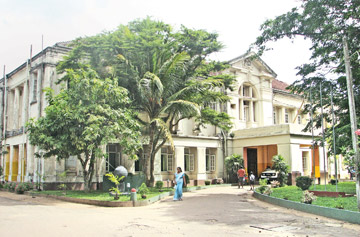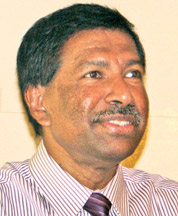Mental health awareness a must
By Ranil WIJAYAPALA
|

Mental hospital, Angoda
|
Kites are seen in the skies of Galle Face in Colombo almost everyday,
on October 9, kites maybe there as usual, but these are flown not by the
fun-makers but by a different set of people who need the attention of
society.
Mentally ill patients from Angoda and Mulleriyawa mental hospitals
and others concerned about the mentally ill will flock to Galle Face
Green in a move to get the attention of the public towards the mentally
ill who are cornered in society.
These mentally ill people will show on October 9, at the kite flying
event organised by the National Institute of Mental Health to coincide
with World Mental Health day which falls on October 10, that they too
are part of society with skills and abilities like the others and need
special attention without being cornered and confined in society.
"Mental illnesses are caused by chemical changes and is an illness
like diabetese, high blood pressure or myocardial infarction. People get
mentally ill without their knowledge. we should treat them like any
other patient and they should enjoy the same privileges that patients
enjoy in society", Dr. Jayan Mendis, Director of the National Institute
of Mental Health said.
Create awareness
|

Dr. Jayan Mendis |
"That is why we need attention to be focussed on mentally ill people
and we are organising events to create awareness as to what is happening
in the mental hospitals and how we treat them," Dr. Mendis added.
"We should open our doors to the the public to see Mental hospitals,
and how psychiatric patients are being treated and the facilities
afforded to patients.National Institute of Mental Health will have an
open house October 10 and 11 for the public where they can visit the
mental hospital," he added.
"Everyone has a role to play to end the stigma that exists today
towards people suffering from mental illness. I invite the public to see
what is happening here and also to participate at the kite flying event
on October 9 at the Galle Face Green at 3 p.m. and join the March for
Mental Health on the same day from Galle Face to Viharamahdevi Park at
5.30 pm", he added.
He says that Sri Lanka has come a long way in improving mental
health, since 2005 after the tsunami but has a long way to go.
"The situation of patients were bad until 2005. Families and patients
had to undergo a lot of difficulties, he added.
Self-care of patients and mental care provided by mental health
professionals was insufficient.
"The non-availability of mental health professionals, medication not
having a proper mental health policy and not having a new Mental Health
Act were huge problem affecting the mental health situation in Sri
Lanka" he added.
"I was appointed Director Mental Health hospital in 2002 and we
started making a lot of changes to improve the condition of this
hospital. By 2003 and 2004, most of the problems were sorted out,he
added.
According to Dr. Mendis in 2004 after the tsunami a lot of people
started coming to Sri Lanka and started looking at mental health
conditions of Sri Lanka we started to work very closely with the Health
Ministry and the WHO and NIMH and Sri Lanka College of Psychiatrists the
four main partners working towards the improvement of mental health care
situation in the country," he added.
"Several donors through the WHO, Ministry of Health provided funds to
start developing small units.
As a result we opened units in Kalutara, Matara, Hambanatota, Nuwara
Eliya, Mannar, Trincomalee, and Anuradhapura and it has now doubled",
Dr. Mendis added.
Increased numbers
We had only 140 nurses and it was increased to 324. The number of
psychiatric social workers were increased from six to 16. Similarly we
had no community nurses to look after the mentally ill people in the
community and doctors trained in mental health other than a few
psychiatrists" he added.
Although the Post Graduate Institute of Medicine trained
psychiatrists, when they go abroad they do not return. To overcome this
situation various new modalities were enforced like confining their
training to Sri Lanka and encouraging them to return.
"Initially we had only 20 psychiatrists now we have 60
psychiatrists," he added.
On the other hand to increase the number of mental health
professionals, a Diploma in Mental Health was introduced to train mental
health professionals with a one-year training program.
We trained a group of 43 Diplomats, then a group of 36, then 24. All
of them will work in the districts in four years.
Apart from that when Degree holders were recruited to the Government
in 2004, the Health Department recruited 500 degree holders of them 80
were trained as psychiatric social workers.
Medication
"Similarly we did not have community nurses. In psychiatrist
illnesses once the patient go back home from hospital there has to be a
mechanism to look after what is happening to this patient whether they
take medication if they don t take medication we need to recommence
medication soon, if they have a replace we need to bring them back to
the hospital early.
All those will improve the quality of care of psychiatrist patients.
For which we needed a category of nurses to go to their homes and see
them, Dr. Mendis added.
Community support offices were also introduced to the system mainly
in the Tsunami affected areas.
"Our plan is to deploy them in small locality where we are expected
to detect psychiatrist illnesses early. Our main problem is that when
they developed a psychiatrist illness they do not come early to
hospital.
To prevent reducing this time we introduced community support
officers. Now our plan is to introduce this system to all the
districts," he added. "We need to focus the attention of the Government
as patients with mental health are not entitled for insurance policies
and insurance claims. Our request is for the government to open the
doors to mentally ill people and for them to have an insurance scheme,"
Dr. Mendis added.
"All insurance schemes don't pay for mental illness, which is wrong.
My request is that the government should take into consideration mental
patients and give them some kind of solace", he said. |

